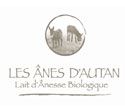products in the comparatorReduce
Les Ânes d'Autan

The first producers of organic donkey milk as well as the founders of Les Ânes d'Autan, Martine Rulens and Nathalie Appelmans produce organic cosmetic products from the raw milk of their donkeys, a unique approach in France.
This passion for donkeys, since their childhood, has changed their lives.
This passion for donkeys, since their childhood, has changed their lives.
It was in 2004 that the adventure of Les Ânes d´Autan started, a farm surrounded by more than 35 hectares of green meadows and forests in the heart of the land of Cocagne. The first donkeys of the herd was nurtured with love and care in the mild climate of the Midi-Pyrénées.
This milk, being rare and precious, was imbued with legend and was used since ancient times for its dermatological virtues. It was used for the first bio-ecological soaps.
The French brand thus offers soaps, body and facial creams, shower gels and shampoos, all certified as organic (Cosmebio etou Nature & Progrès) and not tested on animals.
Today, the herd has 33 donkeys, and Les Ânes d’Autan has added new products, to the delight of their followers, who are constantly growing in number as a result of their satisfaction.
The ethical and ecological commitment of Les Ânes d´Autan brand:
This milk, being rare and precious, was imbued with legend and was used since ancient times for its dermatological virtues. It was used for the first bio-ecological soaps.
The French brand thus offers soaps, body and facial creams, shower gels and shampoos, all certified as organic (Cosmebio etou Nature & Progrès) and not tested on animals.
Today, the herd has 33 donkeys, and Les Ânes d’Autan has added new products, to the delight of their followers, who are constantly growing in number as a result of their satisfaction.
The ethical and ecological commitment of Les Ânes d´Autan brand:
- Respect for life in all its forms, solely natural cosmetic formulas free of harmful ingredients for humans and the environment, ecological packaging without any unnecessary items.
-
An ethical and united approach aimed at supporting the rural region and the farming profession, local partners with businesses on a human scale, short circuits and the desire to develop local distribution at fairs, markets and organic stores.
-
A deep respect for donkeys who benefit from an exceptional living space and quality food. All donkeys are identified with the National Studs and are permanently excluded from the slaughterhouse.
-
Self-eco-renovation of farm premises and offices with natural earth-lime plasters, solar energy for the production of hot water and use of wood as a central heating system, wood from the forest belonging to the brand and carried on horseback.
-
The refusal to export products to the other side of the world despite numerous requests. This would imply increasing the production of milk within the farm, thereby increasing the herd, the grass area and creating uncertainty as to the fate of donkeys ... in other words, pass the operation in intensive production mode. The female-animal relationship would be upset. In addition, it seems incoherent to add a negative carbon footprint (linked to transport) to our range.
- A project to install a rainwater harvesting system on the farm to supply water to donkey basins and vegetable gardens so as to limit drinking water consumption.
Filter results
There are currently no products available in this list..
New products
Copyright© 2004-2025 Idily n°Siret 51151936500015 - VAT number FR65511519365 - VAT number BE0425925218

